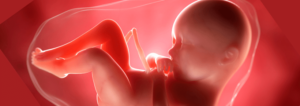The moral value of the human being
The beginning of moral value: the human being from fertilization to birth

Since when
Human beings have been recognized as having a moral value since the dawn of human history. We have been aware of the practice of funeral rituals since the Neanderthals began to bury their dead some 100,000 years ago, an evident sign of the moral consideration of the human person.
And a question that human beings have asked themselves since the most remote times is at what moment of the invisible events that occur within the mother’s womb does that being appear that deserves the moral consideration of a person. A question about which philosophers and thinkers of all ages have expressed themselves with very diverse answers, most of the time supported by a very erroneous scientific knowledge of the origin of life. The idea of Hippocrates of Cos in the 5th century BC that organisms were complete and in miniature within germinal entities, persisted for centuries. It was not until the 18th century, with Caspar F. Wolf and his dissertation “Theoria Generationis”, that the idea expressed by Aristotle that the female provided the constitutive material of the embryo, while this material was vitalized by the male, was established. But it was not until the sixties of the last century, with in vitro cultures of animal embryos, that effective progress was made in the knowledge of early embryonic development.
Biological stages of human development
Human fertilization is the union of a female egg and a male sperm that generally occurs in the fallopian tube. The result of this union is the production of a cell, the zygote or fertilized egg, in which a unique genome is created and the development of the embryo begins. The zygote, as it advances through the fallopian tube towards the uterus, undergoes a series of divisions. In three days the number of 16 cells is reached in what is called the morula stage.
This stage is characterized by the fact that the replicating cells are all the same size and there is no organ differentiation. At this stage, the morula can divide into two, creating monozygotic twins. The cells continue to divide, generating two distinct cell populations, some destined to form the body of the embryo and others that will intervene in the implantation of the embryo in the uterus, which occurs about six days after fertilization.
During the third and fourth week, the process called gastrulation takes place, through which the body plan develops: the cells of the embryo begin to organize themselves into different layers, constituting the germ of the formation of different tissues and organs, characteristic of the adult individual. With gastrulation, the embryo loses the flexibility to reorganize itself and therefore loses the ability to divide into monozygotic twins.
The embryonic phase continues until reaching eight weeks after fertilization, when the body plan, ossification and sex differentiation are completed. From that moment on, the embryo is called a fetus.
In the ninth week, the fetal period begins, which lasts until birth. During fetal life, new organs or tissues are not formed, but the existing ones mature. Around weeks 24-28, the fetus is considered to acquire the specific human encephalogram.
Between weeks 37 and 42, birth occurs. The first breath occurs about ten seconds after birth and a series of changes occur in the lungs and circulatory system.
 When is moral status acquired?
When is moral status acquired?
Today, society is more strongly asking itself the question of when it should confer moral status on an embryo, which needs an answer in order to adequately address the ethical, legal and social problems arising from the interference of man in many aspects and stages of life.
This answer must be framed within the consideration that science provides data on the physical development of the human being, but does not provide information on his personality and uniqueness. In order to form an opinion, we need to resort to a synthesis of scientific data and hypotheses, philosophical thought and the humanities.
The majority position among scientists is that personality begins at fertilization. Geneticists explain that this is where life begins, a unique genome is created and the conditions for generating a new person are met.
The other positions are based on the idea that a biologically human entity becomes a human person at some point after fertilization. Following the chronology of embryonic development, we first find those who consider that human personality begins at gastrulation. They base their argument on the fact that this is the moment at which the embryo loses the capacity to create twins and is therefore defined as a single individual. This argument is explained by the geneticist Ronald M. Green: “But the events of twinning and fusion suggest that, even long after the formation of the zygote, biological individuality is not firmly established. Only at gastrulation can we say that the long process of individuation has been completed.”[1] This moment of gastrulation, day 14, is when the law in Great Britain and other countries such as Singapore, Canada, Australia, India, Japan or the Netherlands recognize the personality of the individual. Many researchers embrace this interpretation: Appleby and Bredenoord, in a study published in 2018, conclude that “the 14-day rule is one of the most internationally agreed standards in reproductive science and medicine to date.”[2]
The “neurological” argument proposes that personality begins when the fetus acquires the specific human EEG pattern. Different arguments are put forward for this: if the EEG pattern determines the end of life, it should also define the beginning of human life; Morowitz and Trefil argue that, just as our species acquired humanity when the expanded cortex developed, the individual fetus acquires humanity when its cortex begins to function.[3]
The moment of birth is the milestone that some consider to be one’s own identity. According to Hebrew tradition, it is when the nephesh, the soul, enters the body, and thus the fetus only acquires full human rights and status once the baby’s head has emerged from the birth canal.
The definition of person to the rescue
But the delimitation of the moment when moral consideration is acquired requires a philosophical analysis that must necessarily start from the definition of person. Since, as Frederick White of Northwestern State University states, “personhood is an essential characteristic of the human species and not a conditional state dependent on circumstances, perception, cognition, or the dictates of society.”[4] And, furthermore, following Farah and Heberlein, “personhood is a foundational concept of ethics, which includes both pure philosophical ethics and the applied field of ethics.”[5]
The definition of personhood is a controversial topic in philosophy, about whose concept very different definitions have been proposed. But the one due to Boethius, stated centuries ago as “an individual substance with a rational nature,” remains valid and operative over time. Regarding it, Paolo Sommaggio, professor at the University of Trento, states that “today it is considered the basis of all convincing discourse on the person”[6] and Peter L. Simpson, professor at The City University of New York, estimates that “a philosophy of the person based on that definition will be more precise and convincing than others.”[7]
The positions indicated above represent a philosophical dilemma that can be summarized in two opposing hypotheses: one that advocates that personality is achieved at some point after fertilization and the other that proposes that fertilization is the moment in which it is achieved.
Those who participate in the first hypothesis consider that being a person implies something more than being human and that certain functions such as consciousness, reasoning, self-determination, communication and self-awareness are required to acquire the category of person. In general terms, they are based on John Locke’s definition of a person, which Peter Singer sets forth as follows: “An intelligent, thinking being that has reason and reflection and can regard itself as itself, the same thinking thing, at different times and places.”[8] According to this line of thinking, a person is defined on the basis of capacity and it is arbitrary to determine when the development of certain organs is adequate to guarantee the condition of a person. As Miklavcic and Flaman point out, “the appearance and development of organs cannot be a criterion for personhood.”[9] Expanding on Locke’s thesis, a baby would not be a person, since a baby lacks the capacity to reason and to regard itself as itself. Stephen D. Schwarz believes that this philosophy confuses the functions of human beings with their own nature.[10]
From Boethius’ definition (a person is “an individual substance of a rational nature”) it follows that one is a person in terms of being a certain kind of thing, not of having certain capacities at the present moment or even at some future or past moment. The second hypothesis is, therefore, in accordance with this definition. At the moment of fertilization, both the sperm and the oocyte lose their identity and their constituents form a new organism, a human embryo that has within it all the necessary information and the active disposition to develop into a mature human body. This means that, at any stage of its development: embryo, fetus, baby… up to the mature human being, the same type of entity is maintained and there is only a difference in the degree of maturation. The human being does not become a human person at some point in the development of the embryo; it does not change entity at any time, but rather a human person is already present at the moment of fertilization. The only phenomenon present throughout the entire cycle of human formation from fertilization is a maturation process directed from the outset by the genetic and epigenetic content of the zygote. For this reason, Lee and George explain to us that having moral status “belongs to a human being at all times in which it exists, not only during certain stages of existence.”[11]
 Objections to the personality of the zygote
Objections to the personality of the zygote
Agata Sagan and Peter Singer, from Princeton University, have raised objections to the attribution of personality to the zygote, stating that stem cells would also deserve the same treatment: “it would seem that if the human embryo has moral status and is entitled to protection by virtue of what it can become, then the same must be true of human embryonic stem cells.”[12] Their reasoning is based on the fact that a stem cell is capable of generating a human embryo by fusing with an enucleated egg, which they consider simply a suitable environment. But this is not the reality, since the enucleated egg is not only a suitable environment, but it actively contributes to reprogramming the fused nucleus, changing the epigenetic state of what was initially a stem cell. The production of a new organism, an embryo, requires the participation of a stem cell and necessarily the cytoplasm of an egg, not of any “suitable environment.”[13]
The 14-day criterion
Special attention deserves the criterion of assessing the gastrulation stage as the starting point of the moral consideration of the individual, since it is accepted as the norm in many countries and much of the scientific research on embryos is based on its acceptance. Those who defend this thesis maintain that genetic uniqueness per se does not convert the zygote into a human individual, and they emphasize the capacity of the zygote to undergo twinning as proof that it lacks individuality in its development and, therefore, cannot yet be considered a human being. Donald Marquis explains it this way: “Consider the four-cell embryo. At this stage, there are four qualitatively identical totipotent cells within the zona pellucida; they cannot all be the individual that has a future similar to our own. Nor can we say that the four cells of the zona pellucida form a single, larger moral individual.”[14]
These arguments underestimate the level of interaction and differentiation between the cells of the zygote at this stage. The explanation by Robert P. George and Alfonso Gómez-Lobo is illuminating: “The clearest evidence that the embryo in the first two weeks is not a mere mass of cells, but a unitary organism, is this: if the individual cells within the embryo before twinning were each independent of the others, there would be no reason why each would not develop regularly on its own. Instead, these supposedly independent and noncommunicating cells function regularly together to develop into a single, more mature member of the human species. This fact demonstrates that an interaction between cells occurs from the very beginning (even within the zona pellucida, before implantation), which prevents them from developing individually as complete organisms and directs each of them to function as a relevant part of a single, complete organism continuous with the zygote. Thus, prior to the extrinsic division of the embryo’s cells, they constitute a single organism. Therefore, the fact of twinning does not prove that the embryo is a mere incidental mass of cells. Rather, the evidence clearly indicates that the human embryo, from the zygote stage onwards, is a unitary human organism.”[15]
 An Obligatory Question
An Obligatory Question
In a recent 2021 article, Steven A. Jacobs of the University of Chicago reports the results of a study that was approved by the University of Chicago’s Institutional Review Board for Behavioral and Social Sciences.[16] The article contains the following statements:
- “Life sciences and biological journals have published articles advocating the biological view that human life begins at fertilization (‘the fertilization view’).”
- “Biologists from 1,058 academic institutions around the world evaluated survey items about when a human’s life begins, and overall, 96% (5,337 of 5,577) affirmed the fertilization view.”
- “Given the recognition of the fertilization view in the entire literature on biology and life sciences, the principles of the modern method of biological classification of organisms based on genetics, and the data of the present study, the fertilization view stands alone as the main biological view on when the life of a human being begins.”
All of this forces us to ask the question: why does society act in ignorance of this evidence?
Manuel Ribes – Instituto Ciencias de la Vida – Observatorio de Bioética – Universidad Católica de Valencia
***
[1] Quoted by Scott Gilbert in his lecture When Does Personhood Begin?, of the Burnhill Prize of the American Association of Reproductive Health in 2009.
[2] John B Appleby & Annelien L. Bredenoord Should the 14‐day rule for embryo research become the 28‐day rule? EMBO Mol Med (2018) 10: e9437 https://doi.org/10.15252/emmm.201809437
[3] Scott F. Gilbert Pseudo-Embryology And Personhood: How Embryological Pseudoscience Helps Structure The American Abortion Debate Natural Sciences 2022 DOI: 10.1002/ntls.2022004
[4] White FJ.Personhood: An essential characteristic of the human species. Linacre Q. 2013 Feb; 80(1):74-97. doi: 10.1179/0024363912Z.00000000010. PMID: 24845541; PMCID: PMC6081772.
[5] Farah MJ, Heberlein AS.Personhood and neuroscience: naturalizing or nihilating?Am J Bioeth. 2007 Jan; 7(1):37-48. doi: 10.1080/15265160601064199. PMID: 17366164.
[6] Sommaggio, Paolo Boethius’ definition of persona: a fundamental principle of modern legal thought, IVR-Symposium Lund 2003, Corpus ID: 169967469
[7] Peter Simpson The Definition of Person: Boethius Revisited – The New Scholasticism, Volume 62, Issue 2, Pages 210-220, Spring 1988
[8] Justin Kalan Peter Singer Forgets Boethius Word on Fire August 2024
[9] Miklavcic JJ, Flaman P. Personhood status of the human zygote, embryo, fetus.Linacre Q. 2017, May; 84(2):130-144. doi:10.1080/00243639.2017.1299896
[10] Khanh Trinh Is the Early Human Embryo a Person? A Metaphysical Defense of Personhood ESS Open Archive April 24, 2024
[11] Lee, Patrick, and Robert P. George.The wrong of abortion. In Contemporary debates in applied ethics, ed. AI. Cohen and C.H. Wellman, 13–26. Malden, MA: Blackwell Publishing Ltd. 2005
[12] Robert P. George & Patrick Lee Embryonic human persons EMBO reports Vol. 10 | no 4 | 2009
[13] Ibid.
[14] RAMSAY M. Twinning and Fusion as Arguments against the Moral Standing of the Early Human Embryo Utilitas 2011; 23(2):183-205. doi:10.1017/S0953820811000057
[15] Ibid.
[16] Jacobs SA. The Scientific Consensus on When a Human’s Life Begins Issues Law Med. 2021 Fall; 36(2):221-233. PMID: 36629778.
Related

Pope Francis spent a peaceful night
Exaudi Staff
02 March, 2025
1 min

Pope Francis has had a peaceful night
Exaudi Staff
25 February, 2025
1 min

What should the boyfriend or girlfriend I should find be like?
Patricia Jiménez Ramírez
24 February, 2025
4 min

The Pope spent a quiet night at Gemelli
Exaudi Staff
23 February, 2025
1 min
 (EN)
(EN)
 (ES)
(ES)
 (IT)
(IT)

